(人教版2019)高考英语 一轮复习夯实基础必背知识清单 专题03.必修第3册 Unit3 Diverse Cultures
文档属性
| 名称 | (人教版2019)高考英语 一轮复习夯实基础必背知识清单 专题03.必修第3册 Unit3 Diverse Cultures |
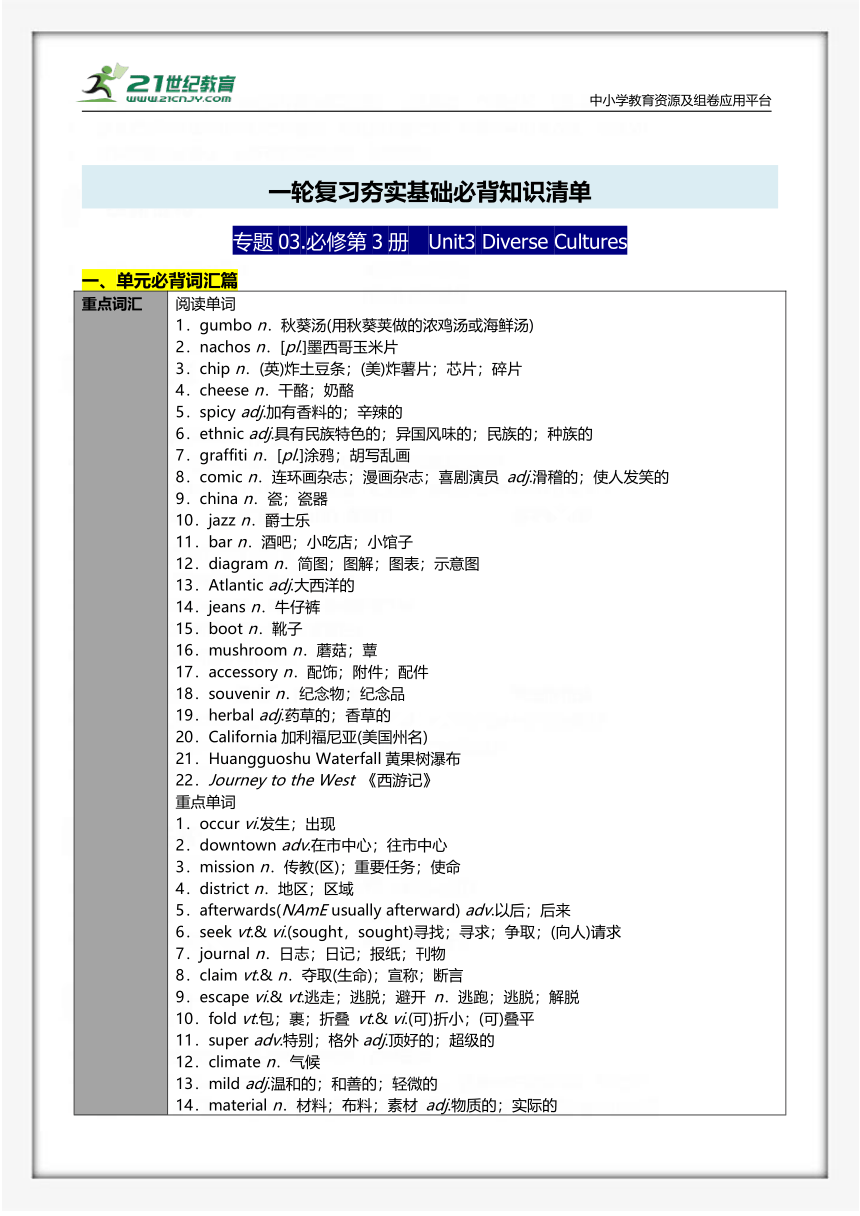
|
|
| 格式 | docx | ||
| 文件大小 | 122.1KB | ||
| 资源类型 | 试卷 | ||
| 版本资源 | 人教版(2019) | ||
| 科目 | 英语 | ||
| 更新时间 | 2022-11-18 17:22:15 | ||
图片预览

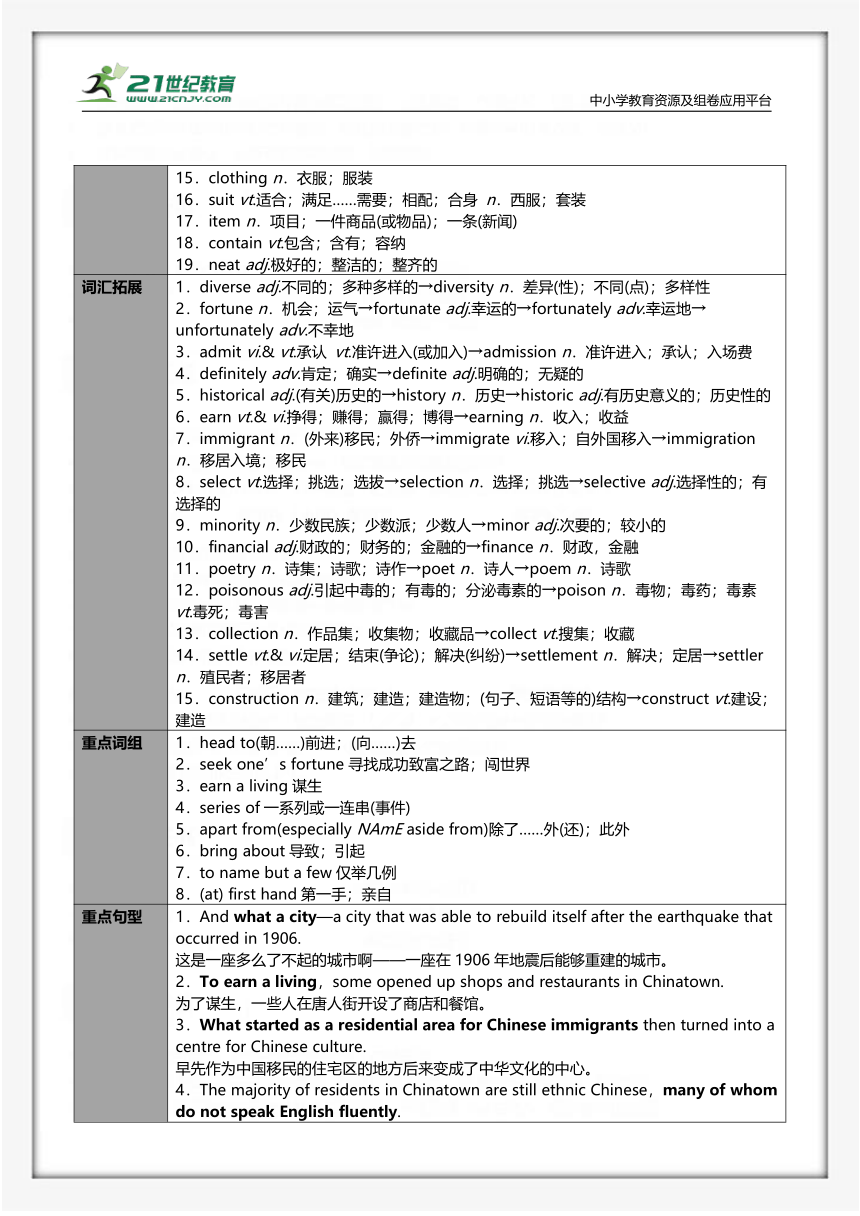
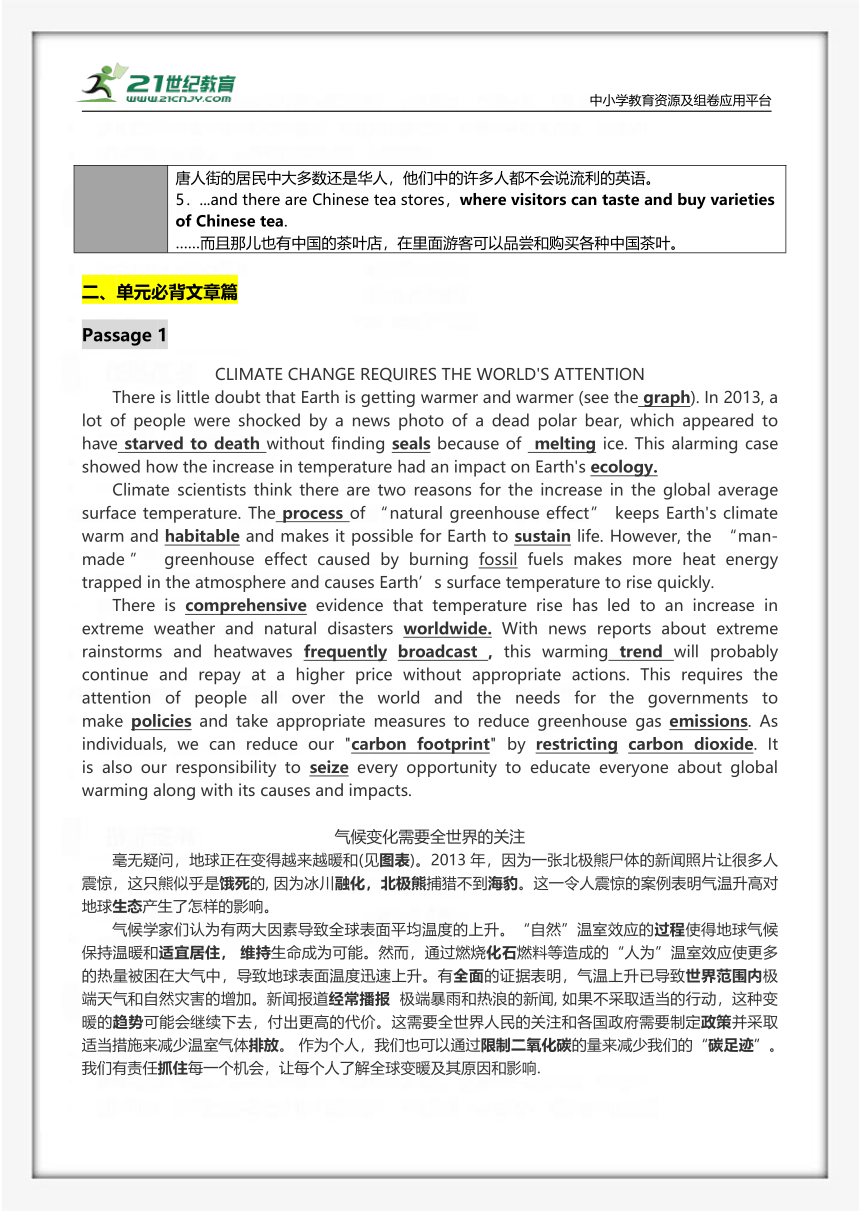
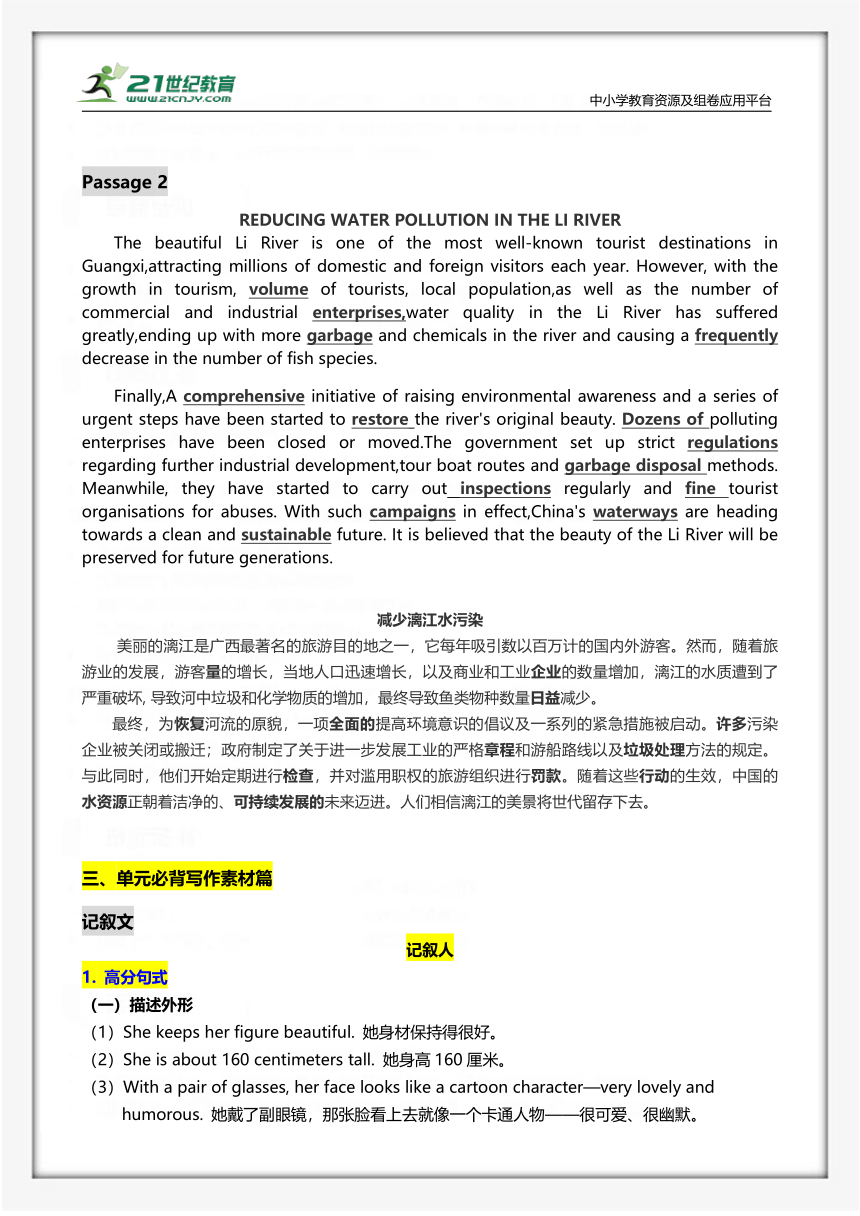
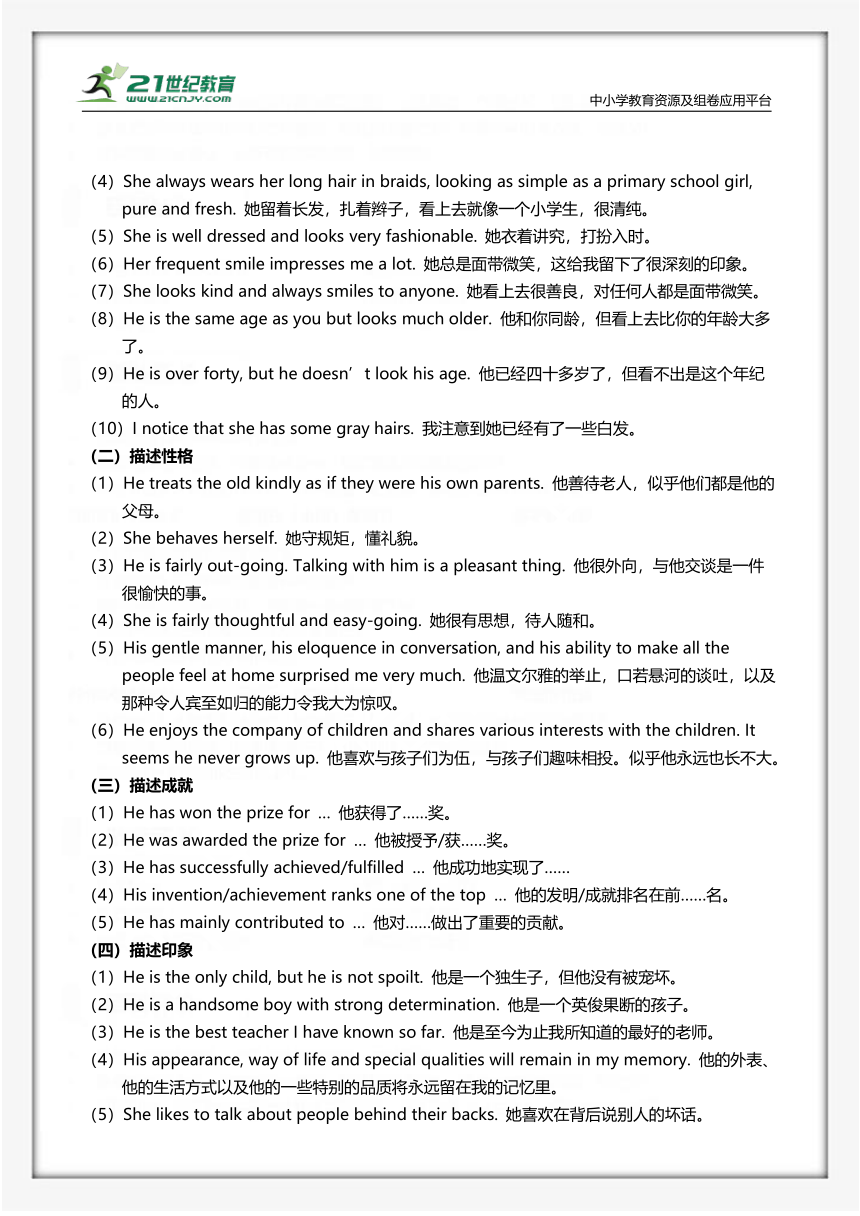
文档简介
中小学教育资源及组卷应用平台
一轮复习夯实基础必背知识清单
专题03.必修第3册 Unit3 Diverse Cultures
一、单元必背词汇篇
重点词汇 阅读单词 1.gumbo n.秋葵汤(用秋葵荚做的浓鸡汤或海鲜汤) 2.nachos n.[pl.]墨西哥玉米片 3.chip n.(英)炸土豆条;(美)炸薯片;芯片;碎片 4.cheese n.干酪;奶酪 5.spicy adj.加有香料的;辛辣的 6.ethnic adj.具有民族特色的;异国风味的;民族的;种族的 7.graffiti n.[pl.]涂鸦;胡写乱画 8.comic n.连环画杂志;漫画杂志;喜剧演员 adj.滑稽的;使人发笑的 9.china n.瓷;瓷器 10.jazz n.爵士乐 11.bar n.酒吧;小吃店;小馆子 12.diagram n.简图;图解;图表;示意图 13.Atlantic adj.大西洋的 14.jeans n.牛仔裤 15.boot n.靴子 16.mushroom n.蘑菇;蕈 17.accessory n.配饰;附件;配件 18.souvenir n.纪念物;纪念品 19.herbal adj.药草的;香草的 20.California加利福尼亚(美国州名) 21.Huangguoshu Waterfall黄果树瀑布 22.Journey to the West 《西游记》 重点单词 1.occur vi.发生;出现 2.downtown adv.在市中心;往市中心 3.mission n.传教(区);重要任务;使命 4.district n.地区;区域 5.afterwards(NAmE usually afterward) adv.以后;后来 6.seek vt.& vi.(sought,sought)寻找;寻求;争取;(向人)请求 7.journal n.日志;日记;报纸;刊物 8.claim vt.& n.夺取(生命);宣称;断言 9.escape vi.& vt.逃走;逃脱;避开 n.逃跑;逃脱;解脱 10.fold vt.包;裹;折叠 vt.& vi.(可)折小;(可)叠平 11.super adv.特别;格外adj.顶好的;超级的 12.climate n.气候 13.mild adj.温和的;和善的;轻微的 14.material n.材料;布料;素材 adj.物质的;实际的 15.clothing n.衣服;服装 16.suit vt.适合;满足……需要;相配;合身 n.西服;套装 17.item n.项目;一件商品(或物品);一条(新闻) 18.contain vt.包含;含有;容纳 19.neat adj.极好的;整洁的;整齐的
词汇拓展 1.diverse adj.不同的;多种多样的→diversity n.差异(性);不同(点);多样性 2.fortune n.机会;运气→fortunate adj.幸运的→fortunately adv.幸运地→unfortunately adv.不幸地 3.admit vi.& vt.承认 vt.准许进入(或加入)→admission n.准许进入;承认;入场费 4.definitely adv.肯定;确实→definite adj.明确的;无疑的 5.historical adj.(有关)历史的→history n.历史→historic adj.有历史意义的;历史性的 6.earn vt.& vi.挣得;赚得;赢得;博得→earning n.收入;收益 7.immigrant n.(外来)移民;外侨→immigrate vi.移入;自外国移入→immigration n.移居入境;移民 8.select vt.选择;挑选;选拔→selection n.选择;挑选→selective adj.选择性的;有选择的 9.minority n.少数民族;少数派;少数人→minor adj.次要的;较小的 10.financial adj.财政的;财务的;金融的→finance n.财政,金融 11.poetry n.诗集;诗歌;诗作→poet n.诗人→poem n.诗歌 12.poisonous adj.引起中毒的;有毒的;分泌毒素的→poison n.毒物;毒药;毒素 vt.毒死;毒害 13.collection n.作品集;收集物;收藏品→collect vt.搜集;收藏 14.settle vt.& vi.定居;结束(争论);解决(纠纷)→settlement n.解决;定居→settler n.殖民者;移居者 15.construction n.建筑;建造;建造物;(句子、短语等的)结构→construct vt.建设;建造
重点词组 1.head to(朝……)前进;(向……)去 2.seek one’s fortune寻找成功致富之路;闯世界 3.earn a living谋生 4.series of一系列或一连串(事件) 5.apart from(especially NAmE aside from)除了……外(还);此外 6.bring about导致;引起 7.to name but a few仅举几例 8.(at) first hand第一手;亲自
重点句型 1.And what a city—a city that was able to rebuild itself after the earthquake that occurred in 1906. 这是一座多么了不起的城市啊——一座在1906年地震后能够重建的城市。 2.To earn a living,some opened up shops and restaurants in Chinatown. 为了谋生,一些人在唐人街开设了商店和餐馆。 3.What started as a residential area for Chinese immigrants then turned into a centre for Chinese culture. 早先作为中国移民的住宅区的地方后来变成了中华文化的中心。 4.The majority of residents in Chinatown are still ethnic Chinese,many of whom do not speak English fluently. 唐人街的居民中大多数还是华人,他们中的许多人都不会说流利的英语。 5....and there are Chinese tea stores,where visitors can taste and buy varieties of Chinese tea. ……而且那儿也有中国的茶叶店,在里面游客可以品尝和购买各种中国茶叶。
单元必背文章篇
Passage 1
CLIMATE CHANGE REQUIRES THE WORLD'S ATTENTION
There is little doubt that Earth is getting warmer and warmer (see the graph). In 2013, a lot of people were shocked by a news photo of a dead polar bear, which appeared to have starved to death without finding seals because of melting ice. This alarming case showed how the increase in temperature had an impact on Earth's ecology.
Climate scientists think there are two reasons for the increase in the global average surface temperature. The process of “natural greenhouse effect” keeps Earth's climate warm and habitable and makes it possible for Earth to sustain life. However, the “man-made” greenhouse effect caused by burning fossil fuels makes more heat energy trapped in the atmosphere and causes Earth’s surface temperature to rise quickly.
There is comprehensive evidence that temperature rise has led to an increase in extreme weather and natural disasters worldwide. With news reports about extreme rainstorms and heatwaves frequently broadcast , this warming trend will probably continue and repay at a higher price without appropriate actions. This requires the attention of people all over the world and the needs for the governments to make policies and take appropriate measures to reduce greenhouse gas emissions. As individuals, we can reduce our "carbon footprint" by restricting carbon dioxide. It is also our responsibility to seize every opportunity to educate everyone about global warming along with its causes and impacts.
气候变化需要全世界的关注
毫无疑问,地球正在变得越来越暖和(见图表)。2013年,因为一张北极熊尸体的新闻照片让很多人震惊,这只熊似乎是饿死的, 因为冰川融化,北极熊捕猎不到海豹。这一令人震惊的案例表明气温升高对地球生态产生了怎样的影响。
气候学家们认为有两大因素导致全球表面平均温度的上升。“自然”温室效应的过程使得地球气候保持温暖和适宜居住, 维持生命成为可能。然而,通过燃烧化石燃料等造成的“人为”温室效应使更多的热量被困在大气中,导致地球表面温度迅速上升。有全面的证据表明,气温上升已导致世界范围内极端天气和自然灾害的增加。新闻报道经常播报 极端暴雨和热浪的新闻, 如果不采取适当的行动,这种变暖的趋势可能会继续下去,付出更高的代价。这需要全世界人民的关注和各国政府需要制定政策并采取适当措施来减少温室气体排放。 作为个人,我们也可以通过限制二氧化碳的量来减少我们的“碳足迹”。我们有责任抓住每一个机会,让每个人了解全球变暖及其原因和影响.
Passage 2
REDUCING WATER POLLUTION IN THE LI RIVER
The beautiful Li River is one of the most well-known tourist destinations in Guangxi,attracting millions of domestic and foreign visitors each year. However, with the growth in tourism, volume of tourists, local population,as well as the number of commercial and industrial enterprises,water quality in the Li River has suffered greatly,ending up with more garbage and chemicals in the river and causing a frequently decrease in the number of fish species.
Finally,A comprehensive initiative of raising environmental awareness and a series of urgent steps have been started to restore the river's original beauty. Dozens of polluting enterprises have been closed or moved.The government set up strict regulations regarding further industrial development,tour boat routes and garbage disposal methods. Meanwhile, they have started to carry out inspections regularly and fine tourist organisations for abuses. With such campaigns in effect,China's waterways are heading towards a clean and sustainable future. It is believed that the beauty of the Li River will be preserved for future generations.
减少漓江水污染
美丽的漓江是广西最著名的旅游目的地之一,它每年吸引数以百万计的国内外游客。然而,随着旅游业的发展,游客量的增长,当地人口迅速增长,以及商业和工业企业的数量增加,漓江的水质遭到了严重破坏, 导致河中垃圾和化学物质的增加,最终导致鱼类物种数量日益减少。
最终,为恢复河流的原貌,一项全面的提高环境意识的倡议及一系列的紧急措施被启动。许多污染企业被关闭或搬迁;政府制定了关于进一步发展工业的严格章程和游船路线以及垃圾处理方法的规定。与此同时,他们开始定期进行检查,并对滥用职权的旅游组织进行罚款。随着这些行动的生效,中国的水资源正朝着洁净的、可持续发展的未来迈进。人们相信漓江的美景将世代留存下去。
三、单元必背写作素材篇
记叙文
记叙人
高分句式
(一)描述外形
(1)She keeps her figure beautiful. 她身材保持得很好。
(2)She is about 160 centimeters tall. 她身高160厘米。
(3)With a pair of glasses, her face looks like a cartoon character—very lovely and humorous. 她戴了副眼镜,那张脸看上去就像一个卡通人物——很可爱、很幽默。
(4)She always wears her long hair in braids, looking as simple as a primary school girl, pure and fresh. 她留着长发,扎着辫子,看上去就像一个小学生,很清纯。
(5)She is well dressed and looks very fashionable. 她衣着讲究,打扮入时。
(6)Her frequent smile impresses me a lot. 她总是面带微笑,这给我留下了很深刻的印象。
(7)She looks kind and always smiles to anyone. 她看上去很善良,对任何人都是面带微笑。
(8)He is the same age as you but looks much older. 他和你同龄,但看上去比你的年龄大多了。
(9)He is over forty, but he doesn’t look his age. 他已经四十多岁了,但看不出是这个年纪的人。
(10)I notice that she has some gray hairs. 我注意到她已经有了一些白发。
(二)描述性格
(1)He treats the old kindly as if they were his own parents. 他善待老人,似乎他们都是他的父母。
(2)She behaves herself. 她守规矩,懂礼貌。
(3)He is fairly out-going. Talking with him is a pleasant thing. 他很外向,与他交谈是一件很愉快的事。
(4)She is fairly thoughtful and easy-going. 她很有思想,待人随和。
(5)His gentle manner, his eloquence in conversation, and his ability to make all the people feel at home surprised me very much. 他温文尔雅的举止,口若悬河的谈吐,以及那种令人宾至如归的能力令我大为惊叹。
(6)He enjoys the company of children and shares various interests with the children. It seems he never grows up. 他喜欢与孩子们为伍,与孩子们趣味相投。似乎他永远也长不大。
(三)描述成就
(1)He has won the prize for … 他获得了……奖。
(2)He was awarded the prize for … 他被授予/获……奖。
(3)He has successfully achieved/fulfilled … 他成功地实现了……
(4)His invention/achievement ranks one of the top … 他的发明/成就排名在前……名。
(5)He has mainly contributed to … 他对……做出了重要的贡献。
(四)描述印象
(1)He is the only child, but he is not spoilt. 他是一个独生子,但他没有被宠坏。
(2)He is a handsome boy with strong determination. 他是一个英俊果断的孩子。
(3)He is the best teacher I have known so far. 他是至今为止我所知道的最好的老师。
(4)His appearance, way of life and special qualities will remain in my memory. 他的外表、他的生活方式以及他的一些特别的品质将永远留在我的记忆里。
(5)She likes to talk about people behind their backs. 她喜欢在背后说别人的坏话。
(6) He gives us the impression of always being too busy to talk. 他给我们的印象是他总是那么忙,连说话的时间都没有。
(7)He is our friend as well as our teacher. 他是我们的老师,也是我们的朋友。
(8)He is strict with his students and in his work. 他严格要求学生,工作也很严谨。
(9)He can be trusted and relied on. 他是可以信任和依靠的人。
(10)The best thing about her is her sense of humor. 她最突出的就是她的幽默感。
记叙事
高分句式
(一)开头:事情发生的时间、地点
One Sunday morning, we went to….
2. A few days ago, I was on my way to school.
Last week, my uncle had an unforgettable experience. …上周,我叔叔有一次不愉快的经历。
(二)事情的发展(注意:文中出现很具体时间时应避免重复用同样的表达法,可用以下句型、词组)
1.I was about to… when…我正要……,突然,……
Hardly had I done…when… No sooner had …done than…我刚……,就……;我一……,就……
2.Unfortunately,
3. To our surprise,
4.To tell the truth, we were frightened at that moment. 老实说我们当时吓坏了
5. since自从
not… until… 直到……才……
in the middle/ course of…在…的过程中
At the same time 同时,然而= in the mean time
two hours later = after 2 hours
in 2 hours 两小时后(与将来时连用);两小时之内(与过去式连用)
after that = later (on) = then那以后;然后
in a minute/ while过了一会儿
in the end结果最后(强调结果) finally最后(强调顺序)
at last终于(强调费尽努力才做到)
soon = before long很快,过不多久
It lasted 2 hours before…
It was/ will be + 一段时间 before…
(三)结果或感想:
1. The old man thanked her again and again.
2.How he regretted what he had done!
3. I was very tired, but I was happy that I did a good deed.
二、介绍事件的常用句型
1. May 18(th), 2005(时间/地点) witnessed/ saw the Fifteenth National Book Fair in Tianjin (天津第十五届全国书市/图书展销). (时间/地点)目睹/见证了某事的发生
2. The 15th National Book Fair was held successfully in Tianjin on May 18th, 2005. 事件在…(时/地)成功举行
3. (As planned, )The 15th … took place in Tianjin on May 18, 2005, which attracted about/ as many as 60 thousand people from all jobs throughout the country.事件如期/按计划在…(时/地)举行
4. May 18th was a special day, when …
三、介绍活动的常用句型
1. There will be 活动(a party/ speech/ contest/ concert/ …) (to be held by 主办者) + where + when 某活动将在某时某地由……举办
2. 活动(A party/ speech/ contest/ concert/…)will be held +where +when 某活动将在某时某地举/进行
3.In order to welcome foreign friends, 主办者will hold 活动(a party/ speech/ …)+ where + when 为了欢迎外国朋友,主办者将在某时某地举办某活动
四、单元必背语法篇
Grammar 省略
为了避免重复,将句子中的一个或几个成分省去,这种语法现象叫省略。省略是避免重复、突出新信息并使上下文紧密连接的一种语法手段。英语中的省略有下列几种情况。
一、简单句的省略
1.祈使句的省略。在祈使句中,通常省略主语you。
Open the window.
请(你)打开窗户。
2.在一些口语中可以省略某些句子成分。
(Is there)Anything else
(还有)其他东西吗?
3.疑问句的答语省略。为避免重复而省略疑问句的答语,这也是常见的一种句式省略。
—Are you a student
——你是一名学生吗?
—Yes,I am(a student).
——是的,我是(一名学生)。
4.感叹句的省略。目的是突出感叹的部分。
What a beautiful girl(she is)!
(她是)多么漂亮的女孩呀!
二、比较结构的省略
在“the+比较级,the+比较级”结构中和由than和as引导的比较句式中,常会有一些成分在上下文清楚的情况下被省略。
The sooner(you do it),the better(it will be).
(你做得)越快(结果就会)越好。
He is cleverer than any other boy (is).
他比其他男孩聪明。
三、并列句中的省略
在由and或but连接的并列句中,常省略一些重复的词或词组。
My father is a lawyer and my mother (is) a teacher.
我爸爸是律师,我妈妈是教师。
She came into the room and (she) turned on the computer.
她进了房间,打开了电脑。
The news made me angry,but (the news made) John happy.
这条消息使我生气,但却让约翰高兴。
四、主从复合句中的省略
1.宾语从句中,连词that常省略,但当有多个并列宾语从句时,只能省略第一个that。
I know(that)she is a teacher and that she is an excellent writer.
我知道她是一名教师,也是一位优秀的作家。
2.表示条件、时间、地点、方式或让步等的状语从句的谓语含有be动词,且从句的主语又和主句中的主语一致,或者主语是it时,常把从句中的主语连同be动词一起省略。
If so(=If it is so),you must go back and get it.
如果是这样的话,你必须回去把它拿来。
Look out for cars when crossing the street (=when you are crossing the street).
穿过街道时要当心车辆。
3.定语从句中的省略。若引导定语从句的关系代词在从句中作宾语,该关系代词一般可省略。
The car(which/that)his father gave him as a birthday present was stolen.
他父亲送给他的作为生日礼物的那辆汽车被盗了。
五、不定式的省略
1.并列的不定式可以省略后面的不定式符号to。但若两个不定式之间表示对比关系时,不省略to。
The book is intended to be read and not (to) be torn.
这本书是供人阅读的而不是供人撕毁的。
The purpose of new technologies is to make life easier, not to make it more difficult.
新技术的目的是要让生活更轻松自在,而不是让生活更困难。
2.某些使役动词如make,let,have等,和感官动词如see, watch,notice,observe等,后面作宾补的不定式须省略to,但若这些动词用于被动语态,则to不省略。
My mother wouldn't let me go to see the film.
我妈妈不会让我去看电影的。
He was noticed to leave the office.
有人注意到他离开了办公室。
3.不定式to后面的内容也可承前省略,此时所省略的成分相当于do so,但一定要有上下文语境。但倘若承前省略的不定式含有作助动词用的have,be的任何形式,to后要保留原形have或be。
—Would you like to study English with me
——你愿意和我一起学英语吗?
—Yes. I'd like to (study English with you).
——是的,我愿意(和你一起学英语)。
She has succeeded in the final examination,but in fact, she ought to have(succeeded in the final examination).
她在期末考试中取得了成功,而实际上,她本就该获得成功。
4.介词but,except(除了)前有实义动词do的具体形式时,后面的不定式不带to。
All he could do was nothing but wait and see.
他所能做的只有等着看看(情况)。
六、虚拟语气中的省略
1.虚拟条件句常省略if,而将were,had,should提前,构成部分倒装。
Had you come here yesterday,you would have met her.
=If you had come here yesterday,you would have met her.
如果你昨天来这儿的话,你就会见到她了。
2.动词advise,suggest(建议),propose,demand,insist(坚持要求),require,command,recommend,order等后的宾语从句及It is...that...主语从句中常省略表虚拟语气的should。
We insisted that they (should) go with us.
我们坚持要求他们和我们一起走。
It is necessary that we (should) learn more words by heart.
我们有必要多记一些单词。
It is suggested that we (should) go to see the film.
有人建议我们去看这部电影。
七、介词的省略
1.在英语中一些与动词、名词、形容词搭配的介词常被省略,而只保留后面的动名词:spend time/money (in) doing sth.; have difficulty/trouble (in) doing sth.;prevent/stop sb.(from)doing sth.。
She spends half an hour (in) doing some reading every day.
她每天花半小时读书。
I have some trouble (in) learning English.
我学英语有困难。
What prevented him (from) going
什么事阻止了他去?
2.表示时间的介词at,on和in用在next,last,this, each,these,yesterday,every,tomorrow等词之前,一般可省略。
We have a final exam (in) every term.
每学期我们都举行一次期末考试。
八、使用so,not等的省略
英语中,可以使用so,not或其他手段来省略上文或问句中的一部分或整个句子。
—Can I put my bike here
——我可以把自行车放在这儿吗?
—You'd better not.
——你最好不要。
—Do you think our team will win
——你认为我们队会赢吗?
—I think so.
——我认为会。
用适当的词或所给词的适当形式填空
1.—Is it going to rain tomorrow
—I'm afraid .
2.Don't plant potatoes till I tell you .
3.—I hear that Bai Shan can't afford his schooling this fall.
—If ,_let's do something for him.
4.—Have you fed the dog
—No, but I'm just going .
5.—I'm afraid the date for the interview doesn't suit me.
—If ,_we can make it another day.
6.—My spoken English is poor, what shall I do
— (join) an English language club to practice, and you'll be good at it.
7.—Would you like to join us in going to Hong Kong's Disneyland this Sunday
—I'd love ,_but I have to prepare for my examination on Monday.
8.—Are you a doctor
—No, but I want .
【答案】1.so/not2.to3.so4.to5.not6.Join7.to8.to be
一轮复习夯实基础必背知识清单
专题03.必修第3册 Unit3 Diverse Cultures
一、单元必背词汇篇
重点词汇 阅读单词 1.gumbo n.秋葵汤(用秋葵荚做的浓鸡汤或海鲜汤) 2.nachos n.[pl.]墨西哥玉米片 3.chip n.(英)炸土豆条;(美)炸薯片;芯片;碎片 4.cheese n.干酪;奶酪 5.spicy adj.加有香料的;辛辣的 6.ethnic adj.具有民族特色的;异国风味的;民族的;种族的 7.graffiti n.[pl.]涂鸦;胡写乱画 8.comic n.连环画杂志;漫画杂志;喜剧演员 adj.滑稽的;使人发笑的 9.china n.瓷;瓷器 10.jazz n.爵士乐 11.bar n.酒吧;小吃店;小馆子 12.diagram n.简图;图解;图表;示意图 13.Atlantic adj.大西洋的 14.jeans n.牛仔裤 15.boot n.靴子 16.mushroom n.蘑菇;蕈 17.accessory n.配饰;附件;配件 18.souvenir n.纪念物;纪念品 19.herbal adj.药草的;香草的 20.California加利福尼亚(美国州名) 21.Huangguoshu Waterfall黄果树瀑布 22.Journey to the West 《西游记》 重点单词 1.occur vi.发生;出现 2.downtown adv.在市中心;往市中心 3.mission n.传教(区);重要任务;使命 4.district n.地区;区域 5.afterwards(NAmE usually afterward) adv.以后;后来 6.seek vt.& vi.(sought,sought)寻找;寻求;争取;(向人)请求 7.journal n.日志;日记;报纸;刊物 8.claim vt.& n.夺取(生命);宣称;断言 9.escape vi.& vt.逃走;逃脱;避开 n.逃跑;逃脱;解脱 10.fold vt.包;裹;折叠 vt.& vi.(可)折小;(可)叠平 11.super adv.特别;格外adj.顶好的;超级的 12.climate n.气候 13.mild adj.温和的;和善的;轻微的 14.material n.材料;布料;素材 adj.物质的;实际的 15.clothing n.衣服;服装 16.suit vt.适合;满足……需要;相配;合身 n.西服;套装 17.item n.项目;一件商品(或物品);一条(新闻) 18.contain vt.包含;含有;容纳 19.neat adj.极好的;整洁的;整齐的
词汇拓展 1.diverse adj.不同的;多种多样的→diversity n.差异(性);不同(点);多样性 2.fortune n.机会;运气→fortunate adj.幸运的→fortunately adv.幸运地→unfortunately adv.不幸地 3.admit vi.& vt.承认 vt.准许进入(或加入)→admission n.准许进入;承认;入场费 4.definitely adv.肯定;确实→definite adj.明确的;无疑的 5.historical adj.(有关)历史的→history n.历史→historic adj.有历史意义的;历史性的 6.earn vt.& vi.挣得;赚得;赢得;博得→earning n.收入;收益 7.immigrant n.(外来)移民;外侨→immigrate vi.移入;自外国移入→immigration n.移居入境;移民 8.select vt.选择;挑选;选拔→selection n.选择;挑选→selective adj.选择性的;有选择的 9.minority n.少数民族;少数派;少数人→minor adj.次要的;较小的 10.financial adj.财政的;财务的;金融的→finance n.财政,金融 11.poetry n.诗集;诗歌;诗作→poet n.诗人→poem n.诗歌 12.poisonous adj.引起中毒的;有毒的;分泌毒素的→poison n.毒物;毒药;毒素 vt.毒死;毒害 13.collection n.作品集;收集物;收藏品→collect vt.搜集;收藏 14.settle vt.& vi.定居;结束(争论);解决(纠纷)→settlement n.解决;定居→settler n.殖民者;移居者 15.construction n.建筑;建造;建造物;(句子、短语等的)结构→construct vt.建设;建造
重点词组 1.head to(朝……)前进;(向……)去 2.seek one’s fortune寻找成功致富之路;闯世界 3.earn a living谋生 4.series of一系列或一连串(事件) 5.apart from(especially NAmE aside from)除了……外(还);此外 6.bring about导致;引起 7.to name but a few仅举几例 8.(at) first hand第一手;亲自
重点句型 1.And what a city—a city that was able to rebuild itself after the earthquake that occurred in 1906. 这是一座多么了不起的城市啊——一座在1906年地震后能够重建的城市。 2.To earn a living,some opened up shops and restaurants in Chinatown. 为了谋生,一些人在唐人街开设了商店和餐馆。 3.What started as a residential area for Chinese immigrants then turned into a centre for Chinese culture. 早先作为中国移民的住宅区的地方后来变成了中华文化的中心。 4.The majority of residents in Chinatown are still ethnic Chinese,many of whom do not speak English fluently. 唐人街的居民中大多数还是华人,他们中的许多人都不会说流利的英语。 5....and there are Chinese tea stores,where visitors can taste and buy varieties of Chinese tea. ……而且那儿也有中国的茶叶店,在里面游客可以品尝和购买各种中国茶叶。
单元必背文章篇
Passage 1
CLIMATE CHANGE REQUIRES THE WORLD'S ATTENTION
There is little doubt that Earth is getting warmer and warmer (see the graph). In 2013, a lot of people were shocked by a news photo of a dead polar bear, which appeared to have starved to death without finding seals because of melting ice. This alarming case showed how the increase in temperature had an impact on Earth's ecology.
Climate scientists think there are two reasons for the increase in the global average surface temperature. The process of “natural greenhouse effect” keeps Earth's climate warm and habitable and makes it possible for Earth to sustain life. However, the “man-made” greenhouse effect caused by burning fossil fuels makes more heat energy trapped in the atmosphere and causes Earth’s surface temperature to rise quickly.
There is comprehensive evidence that temperature rise has led to an increase in extreme weather and natural disasters worldwide. With news reports about extreme rainstorms and heatwaves frequently broadcast , this warming trend will probably continue and repay at a higher price without appropriate actions. This requires the attention of people all over the world and the needs for the governments to make policies and take appropriate measures to reduce greenhouse gas emissions. As individuals, we can reduce our "carbon footprint" by restricting carbon dioxide. It is also our responsibility to seize every opportunity to educate everyone about global warming along with its causes and impacts.
气候变化需要全世界的关注
毫无疑问,地球正在变得越来越暖和(见图表)。2013年,因为一张北极熊尸体的新闻照片让很多人震惊,这只熊似乎是饿死的, 因为冰川融化,北极熊捕猎不到海豹。这一令人震惊的案例表明气温升高对地球生态产生了怎样的影响。
气候学家们认为有两大因素导致全球表面平均温度的上升。“自然”温室效应的过程使得地球气候保持温暖和适宜居住, 维持生命成为可能。然而,通过燃烧化石燃料等造成的“人为”温室效应使更多的热量被困在大气中,导致地球表面温度迅速上升。有全面的证据表明,气温上升已导致世界范围内极端天气和自然灾害的增加。新闻报道经常播报 极端暴雨和热浪的新闻, 如果不采取适当的行动,这种变暖的趋势可能会继续下去,付出更高的代价。这需要全世界人民的关注和各国政府需要制定政策并采取适当措施来减少温室气体排放。 作为个人,我们也可以通过限制二氧化碳的量来减少我们的“碳足迹”。我们有责任抓住每一个机会,让每个人了解全球变暖及其原因和影响.
Passage 2
REDUCING WATER POLLUTION IN THE LI RIVER
The beautiful Li River is one of the most well-known tourist destinations in Guangxi,attracting millions of domestic and foreign visitors each year. However, with the growth in tourism, volume of tourists, local population,as well as the number of commercial and industrial enterprises,water quality in the Li River has suffered greatly,ending up with more garbage and chemicals in the river and causing a frequently decrease in the number of fish species.
Finally,A comprehensive initiative of raising environmental awareness and a series of urgent steps have been started to restore the river's original beauty. Dozens of polluting enterprises have been closed or moved.The government set up strict regulations regarding further industrial development,tour boat routes and garbage disposal methods. Meanwhile, they have started to carry out inspections regularly and fine tourist organisations for abuses. With such campaigns in effect,China's waterways are heading towards a clean and sustainable future. It is believed that the beauty of the Li River will be preserved for future generations.
减少漓江水污染
美丽的漓江是广西最著名的旅游目的地之一,它每年吸引数以百万计的国内外游客。然而,随着旅游业的发展,游客量的增长,当地人口迅速增长,以及商业和工业企业的数量增加,漓江的水质遭到了严重破坏, 导致河中垃圾和化学物质的增加,最终导致鱼类物种数量日益减少。
最终,为恢复河流的原貌,一项全面的提高环境意识的倡议及一系列的紧急措施被启动。许多污染企业被关闭或搬迁;政府制定了关于进一步发展工业的严格章程和游船路线以及垃圾处理方法的规定。与此同时,他们开始定期进行检查,并对滥用职权的旅游组织进行罚款。随着这些行动的生效,中国的水资源正朝着洁净的、可持续发展的未来迈进。人们相信漓江的美景将世代留存下去。
三、单元必背写作素材篇
记叙文
记叙人
高分句式
(一)描述外形
(1)She keeps her figure beautiful. 她身材保持得很好。
(2)She is about 160 centimeters tall. 她身高160厘米。
(3)With a pair of glasses, her face looks like a cartoon character—very lovely and humorous. 她戴了副眼镜,那张脸看上去就像一个卡通人物——很可爱、很幽默。
(4)She always wears her long hair in braids, looking as simple as a primary school girl, pure and fresh. 她留着长发,扎着辫子,看上去就像一个小学生,很清纯。
(5)She is well dressed and looks very fashionable. 她衣着讲究,打扮入时。
(6)Her frequent smile impresses me a lot. 她总是面带微笑,这给我留下了很深刻的印象。
(7)She looks kind and always smiles to anyone. 她看上去很善良,对任何人都是面带微笑。
(8)He is the same age as you but looks much older. 他和你同龄,但看上去比你的年龄大多了。
(9)He is over forty, but he doesn’t look his age. 他已经四十多岁了,但看不出是这个年纪的人。
(10)I notice that she has some gray hairs. 我注意到她已经有了一些白发。
(二)描述性格
(1)He treats the old kindly as if they were his own parents. 他善待老人,似乎他们都是他的父母。
(2)She behaves herself. 她守规矩,懂礼貌。
(3)He is fairly out-going. Talking with him is a pleasant thing. 他很外向,与他交谈是一件很愉快的事。
(4)She is fairly thoughtful and easy-going. 她很有思想,待人随和。
(5)His gentle manner, his eloquence in conversation, and his ability to make all the people feel at home surprised me very much. 他温文尔雅的举止,口若悬河的谈吐,以及那种令人宾至如归的能力令我大为惊叹。
(6)He enjoys the company of children and shares various interests with the children. It seems he never grows up. 他喜欢与孩子们为伍,与孩子们趣味相投。似乎他永远也长不大。
(三)描述成就
(1)He has won the prize for … 他获得了……奖。
(2)He was awarded the prize for … 他被授予/获……奖。
(3)He has successfully achieved/fulfilled … 他成功地实现了……
(4)His invention/achievement ranks one of the top … 他的发明/成就排名在前……名。
(5)He has mainly contributed to … 他对……做出了重要的贡献。
(四)描述印象
(1)He is the only child, but he is not spoilt. 他是一个独生子,但他没有被宠坏。
(2)He is a handsome boy with strong determination. 他是一个英俊果断的孩子。
(3)He is the best teacher I have known so far. 他是至今为止我所知道的最好的老师。
(4)His appearance, way of life and special qualities will remain in my memory. 他的外表、他的生活方式以及他的一些特别的品质将永远留在我的记忆里。
(5)She likes to talk about people behind their backs. 她喜欢在背后说别人的坏话。
(6) He gives us the impression of always being too busy to talk. 他给我们的印象是他总是那么忙,连说话的时间都没有。
(7)He is our friend as well as our teacher. 他是我们的老师,也是我们的朋友。
(8)He is strict with his students and in his work. 他严格要求学生,工作也很严谨。
(9)He can be trusted and relied on. 他是可以信任和依靠的人。
(10)The best thing about her is her sense of humor. 她最突出的就是她的幽默感。
记叙事
高分句式
(一)开头:事情发生的时间、地点
One Sunday morning, we went to….
2. A few days ago, I was on my way to school.
Last week, my uncle had an unforgettable experience. …上周,我叔叔有一次不愉快的经历。
(二)事情的发展(注意:文中出现很具体时间时应避免重复用同样的表达法,可用以下句型、词组)
1.I was about to… when…我正要……,突然,……
Hardly had I done…when… No sooner had …done than…我刚……,就……;我一……,就……
2.Unfortunately,
3. To our surprise,
4.To tell the truth, we were frightened at that moment. 老实说我们当时吓坏了
5. since自从
not… until… 直到……才……
in the middle/ course of…在…的过程中
At the same time 同时,然而= in the mean time
two hours later = after 2 hours
in 2 hours 两小时后(与将来时连用);两小时之内(与过去式连用)
after that = later (on) = then那以后;然后
in a minute/ while过了一会儿
in the end结果最后(强调结果) finally最后(强调顺序)
at last终于(强调费尽努力才做到)
soon = before long很快,过不多久
It lasted 2 hours before…
It was/ will be + 一段时间 before…
(三)结果或感想:
1. The old man thanked her again and again.
2.How he regretted what he had done!
3. I was very tired, but I was happy that I did a good deed.
二、介绍事件的常用句型
1. May 18(th), 2005(时间/地点) witnessed/ saw the Fifteenth National Book Fair in Tianjin (天津第十五届全国书市/图书展销). (时间/地点)目睹/见证了某事的发生
2. The 15th National Book Fair was held successfully in Tianjin on May 18th, 2005. 事件在…(时/地)成功举行
3. (As planned, )The 15th … took place in Tianjin on May 18, 2005, which attracted about/ as many as 60 thousand people from all jobs throughout the country.事件如期/按计划在…(时/地)举行
4. May 18th was a special day, when …
三、介绍活动的常用句型
1. There will be 活动(a party/ speech/ contest/ concert/ …) (to be held by 主办者) + where + when 某活动将在某时某地由……举办
2. 活动(A party/ speech/ contest/ concert/…)will be held +where +when 某活动将在某时某地举/进行
3.In order to welcome foreign friends, 主办者will hold 活动(a party/ speech/ …)+ where + when 为了欢迎外国朋友,主办者将在某时某地举办某活动
四、单元必背语法篇
Grammar 省略
为了避免重复,将句子中的一个或几个成分省去,这种语法现象叫省略。省略是避免重复、突出新信息并使上下文紧密连接的一种语法手段。英语中的省略有下列几种情况。
一、简单句的省略
1.祈使句的省略。在祈使句中,通常省略主语you。
Open the window.
请(你)打开窗户。
2.在一些口语中可以省略某些句子成分。
(Is there)Anything else
(还有)其他东西吗?
3.疑问句的答语省略。为避免重复而省略疑问句的答语,这也是常见的一种句式省略。
—Are you a student
——你是一名学生吗?
—Yes,I am(a student).
——是的,我是(一名学生)。
4.感叹句的省略。目的是突出感叹的部分。
What a beautiful girl(she is)!
(她是)多么漂亮的女孩呀!
二、比较结构的省略
在“the+比较级,the+比较级”结构中和由than和as引导的比较句式中,常会有一些成分在上下文清楚的情况下被省略。
The sooner(you do it),the better(it will be).
(你做得)越快(结果就会)越好。
He is cleverer than any other boy (is).
他比其他男孩聪明。
三、并列句中的省略
在由and或but连接的并列句中,常省略一些重复的词或词组。
My father is a lawyer and my mother (is) a teacher.
我爸爸是律师,我妈妈是教师。
She came into the room and (she) turned on the computer.
她进了房间,打开了电脑。
The news made me angry,but (the news made) John happy.
这条消息使我生气,但却让约翰高兴。
四、主从复合句中的省略
1.宾语从句中,连词that常省略,但当有多个并列宾语从句时,只能省略第一个that。
I know(that)she is a teacher and that she is an excellent writer.
我知道她是一名教师,也是一位优秀的作家。
2.表示条件、时间、地点、方式或让步等的状语从句的谓语含有be动词,且从句的主语又和主句中的主语一致,或者主语是it时,常把从句中的主语连同be动词一起省略。
If so(=If it is so),you must go back and get it.
如果是这样的话,你必须回去把它拿来。
Look out for cars when crossing the street (=when you are crossing the street).
穿过街道时要当心车辆。
3.定语从句中的省略。若引导定语从句的关系代词在从句中作宾语,该关系代词一般可省略。
The car(which/that)his father gave him as a birthday present was stolen.
他父亲送给他的作为生日礼物的那辆汽车被盗了。
五、不定式的省略
1.并列的不定式可以省略后面的不定式符号to。但若两个不定式之间表示对比关系时,不省略to。
The book is intended to be read and not (to) be torn.
这本书是供人阅读的而不是供人撕毁的。
The purpose of new technologies is to make life easier, not to make it more difficult.
新技术的目的是要让生活更轻松自在,而不是让生活更困难。
2.某些使役动词如make,let,have等,和感官动词如see, watch,notice,observe等,后面作宾补的不定式须省略to,但若这些动词用于被动语态,则to不省略。
My mother wouldn't let me go to see the film.
我妈妈不会让我去看电影的。
He was noticed to leave the office.
有人注意到他离开了办公室。
3.不定式to后面的内容也可承前省略,此时所省略的成分相当于do so,但一定要有上下文语境。但倘若承前省略的不定式含有作助动词用的have,be的任何形式,to后要保留原形have或be。
—Would you like to study English with me
——你愿意和我一起学英语吗?
—Yes. I'd like to (study English with you).
——是的,我愿意(和你一起学英语)。
She has succeeded in the final examination,but in fact, she ought to have(succeeded in the final examination).
她在期末考试中取得了成功,而实际上,她本就该获得成功。
4.介词but,except(除了)前有实义动词do的具体形式时,后面的不定式不带to。
All he could do was nothing but wait and see.
他所能做的只有等着看看(情况)。
六、虚拟语气中的省略
1.虚拟条件句常省略if,而将were,had,should提前,构成部分倒装。
Had you come here yesterday,you would have met her.
=If you had come here yesterday,you would have met her.
如果你昨天来这儿的话,你就会见到她了。
2.动词advise,suggest(建议),propose,demand,insist(坚持要求),require,command,recommend,order等后的宾语从句及It is...that...主语从句中常省略表虚拟语气的should。
We insisted that they (should) go with us.
我们坚持要求他们和我们一起走。
It is necessary that we (should) learn more words by heart.
我们有必要多记一些单词。
It is suggested that we (should) go to see the film.
有人建议我们去看这部电影。
七、介词的省略
1.在英语中一些与动词、名词、形容词搭配的介词常被省略,而只保留后面的动名词:spend time/money (in) doing sth.; have difficulty/trouble (in) doing sth.;prevent/stop sb.(from)doing sth.。
She spends half an hour (in) doing some reading every day.
她每天花半小时读书。
I have some trouble (in) learning English.
我学英语有困难。
What prevented him (from) going
什么事阻止了他去?
2.表示时间的介词at,on和in用在next,last,this, each,these,yesterday,every,tomorrow等词之前,一般可省略。
We have a final exam (in) every term.
每学期我们都举行一次期末考试。
八、使用so,not等的省略
英语中,可以使用so,not或其他手段来省略上文或问句中的一部分或整个句子。
—Can I put my bike here
——我可以把自行车放在这儿吗?
—You'd better not.
——你最好不要。
—Do you think our team will win
——你认为我们队会赢吗?
—I think so.
——我认为会。
用适当的词或所给词的适当形式填空
1.—Is it going to rain tomorrow
—I'm afraid .
2.Don't plant potatoes till I tell you .
3.—I hear that Bai Shan can't afford his schooling this fall.
—If ,_let's do something for him.
4.—Have you fed the dog
—No, but I'm just going .
5.—I'm afraid the date for the interview doesn't suit me.
—If ,_we can make it another day.
6.—My spoken English is poor, what shall I do
— (join) an English language club to practice, and you'll be good at it.
7.—Would you like to join us in going to Hong Kong's Disneyland this Sunday
—I'd love ,_but I have to prepare for my examination on Monday.
8.—Are you a doctor
—No, but I want .
【答案】1.so/not2.to3.so4.to5.not6.Join7.to8.to be
